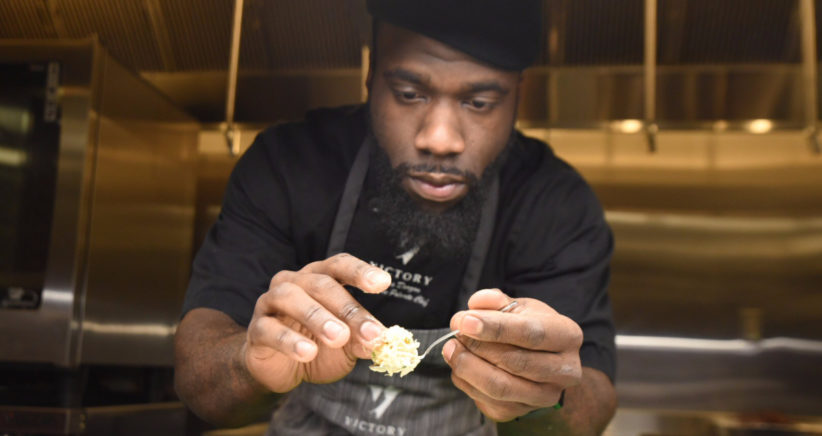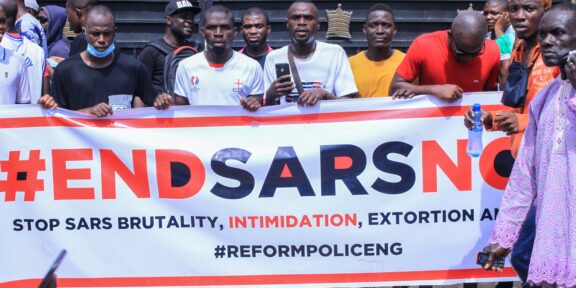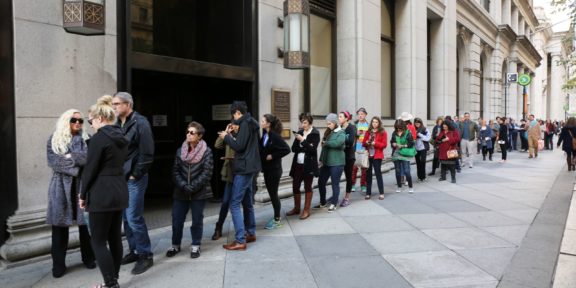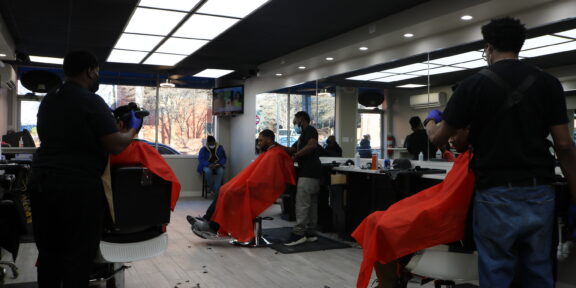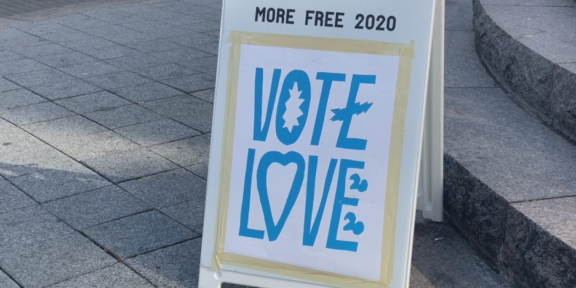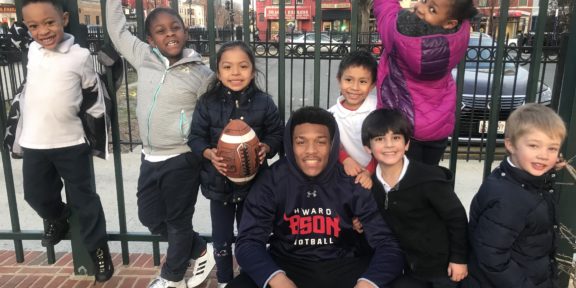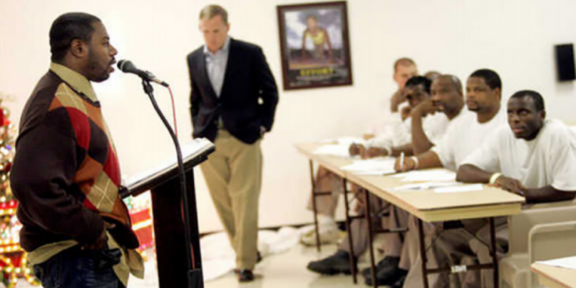Editor’s Note: This story originally appeared on The Black Capitale, a Newslab Capstone Project.
WASHINGTON – When thinking about professional black athletes who have successfully ventured into entrepreneurship and owning businesses, few that come to mind may include Michael Jordan, Magic Johnson, Venus Williams, George Foreman, LeBron James, Kobe Bryant and others. These current and former athletes are a small percentage that has helped create unique blueprints for other athletes to venture into entrepreneurship during and after their professional careers.
According to Small Business Trends, in 2012 an African-American headed 9.4 percent of the total companies in the United States.
While the percentage has grown over the years, the numbers are still relatively small, as also in 2012, sales of African-American-led companies accounted for only 0.6 percent of sales of all American companies.
Over the years, many professional athletes in all sports have taken the time to invest in other ventures in order to explore entrepreneurship through their respective businesses. Whether it is through philanthropy, investments, sponsorships, stocks, or personal-owned businesses, having ownership helps exemplify how African-Americans can build their own empire in America.
Dorzon trades cleats for spatula
Born and raised in Washington, D.C., Chef Bloi-Dei “Tobias” Dorzon, 32, celebrity chef and founder of Victory Chefs LLC, is one of these entrepreneur athletes who has deepened his passion for cooking over the years into a full-time dedication.

After multiple years in both the National Football League and Canadian Football League, the former football player decided to study at the Art Institute of Washington during his last two seasons. He also went abroad to Brazil where he began apprenticing at local restaurants. Years later, Dorzon has unofficially been named the “chef of D.C. athletes.”
“Cooking has always been second nature to me, but I didn’t take it seriously until I got into the league and decided to attend culinary school during my offseason,” said Dorzon. “The first time I saw people loving my creations, I knew it could be a career full time,” he told The Black Capitale.
An alumnus of Jackson State University, Dorzon would host fish fries for his football teammates. The experience at Jackson, a historically black college and university (HBCU), would diversify his mindset not only in his cooking abilities but also in how he viewed life.
“I grew up in a predominantly black neighborhood, so going to an HBCU wasn’t anything different for me,” said Dorzon. “I used to cook for my teammates, which was probably when I knew I could be a chef for real. It was good to be with people who I, still to this day, consider my brothers.”
“It was like a family…only HBCUs can give students that type of experience.”

According to an April 2015 working paper from the National Bureau of Economic Research (NBER), 15.7 percent of NFL players have filed for bankruptcy 12 years after they retired. A survey conducted by both Newsday and the NFL Players Association shown that out of the 763 former NFL players that took the survey, 61 percent said they found it difficult to adjust to daily life after their career, while 85 percent said they didn’t feel that the NFL effectively prepared them for the transitioning back to post-professional life.
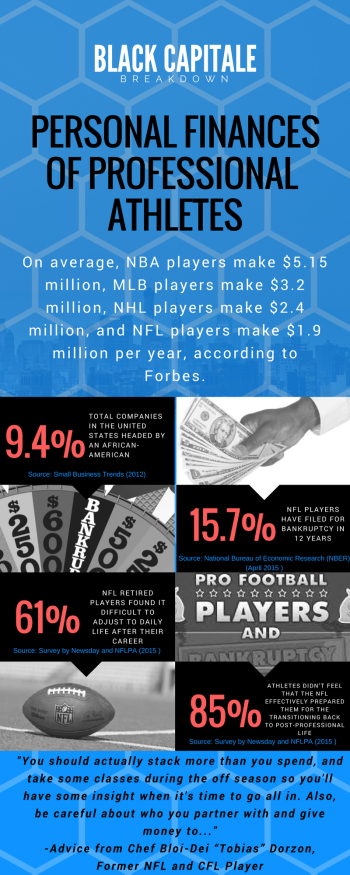
Marvin Washington, professor and department chair of the Alberta School of Business at the University of Alberta, said that it isn’t too surprising that people out of work become entrepreneurs, especially athletes. Washington suggested that for those coming out the league, that they should try to go into business academia based on their experience with money.
“Some athletes will try to capitalize somehow over their name or their local celebrity status in an entrepreneurial venture because that’s really what’s afforded to them outside of work,” said Washington. “I would really hope that they translate their professional sport experience into academic experience because there are lots of examples of athletes who have made bad business decisions that others can learn from,” he told The Black Capitale.
“Even if it’s not a formal degree, I would get hope that they get some kind education or training in business organization. That’s the mistake that many athletes make when becoming entrepreneurs…it’s that they just haven’t thought it through. They may or may not get a degree, but it’s something,” he said.
Dorzon said for athletes who want to one day venture into entrepreneurship, the biggest thing is to simply not to spend all of their money.
“You should actually stack more than you spend, and take some classes during the offseason so you’ll have some insight when it’s time to go all in. Also, be careful about who you partner with and give money to. Everyone has their hand out when they know you’re making money. Be smart,” said Dorzon.
Dorzon said even after leaving the NFL, he still has conversations with his former teammates and clients about how to make the transition back to the “real world” with the current opportunities they have as athletes.
NFL tries to prompt dual track system
Currently, the NFLPA has collaborated with numerous companies in order to create partnerships and provide opportunities for both current and former players to prepare for their next career. One main initiative, The OneTeam Collective, is a groundbreaking, athlete-driven business accelerator designed to spur growth for innovative companies seeking to align their products and services with a thriving sports industry.
Ascending Athletes, another organization which has collaborated with the NFLPA, was founded to assist professional athletes achieve their career goals beyond sports. It has also helped athletes by creating a business symposium for national companies to network, gain insight, and participate in real-time interviews and meeting with each other.
Andy Schroeder, the founder of Ascending Athletes, said the organization understands the challenges professional athletes face once they move on from their athletic career.
“With Ascending Athletes, we strive to make the next step in life [for athletes] as smooth and successful as possible,” said Schroeder.

For Dorzon, the opportunity to open up his own business and to build security for his daughters was something that he kept in mind when thinking of creating Victory Chefs LLC.
“You have to learn from those who are doing what you want to do and I want to build something that I can pass on to my daughters,” said Dorzon. “After almost three years, I’m just getting my stride because it’s been a lot of trial and error.”
With operating his own business, Tobias has witnessed the changes over the years of black businesses and their current standing within the District of Columbia. With gentrification affecting many neighborhoods from Northwest to Southeast D.C., Tobias still believes that the 28 percent of black businesses in the district, the highest ratio in America, are still thriving through the changes.
“It’s unfortunate that some black businesses aren’t able to sustain running in the District, but there definitely are some that are doing amazing things,” said Dorzon. “It’s all about collaborating, fine-tuning the business processes and getting help when you need it,” he told The Black Capitale.
When creating his business, Dorzon knew that he couldn’t be a one-man show. Because of this, he expanded his staff in order to ensure his business would continue to grow.
“I used to try and do everything myself, which hurt the business,” said Dorzon. “Now, I have a manager who books gigs, plans events and handles all branding stuff; and a bookkeeper that takes care of all the money. Everything is ran by me for approval, but I let them do their thing because they’re experts in what they do. I also have a team of cooks who help out with large events.”
After three years of hard work, Dorzon is set to open a food truck in late November. He expressed that he is extremely excited for the next chapter as an entrepreneur.
“Right now, I’m 100 percent focused on opening The Victory Truck, my mobile kitchen that will feature the very best in gourmet comfort food and open later this year. Long-term, I envision multiple trucks, carefully curated culinary events around the world and a restaurant,” said Dorzon.
“I’m taking things day-by-day though and appreciating each moment that I’m here on Earth doing what I truly love.”

